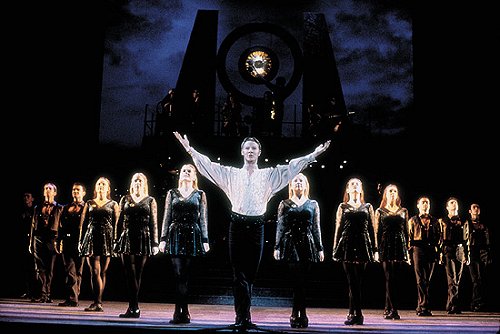|
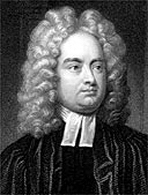 |
Jonathan Swift (1667 - 1745)
Clergyman and satirist, born
in
Dublin. He
studied at
Dublin, then
moved to
England,
where he became secretary a diplomat. He was ordained
in the Anglican Church (1695). He wrote several poems, then turned to prose
satire, exposing religious and intellectual complacency in A Tale of a Tub
(1704), and produced a wide range of political
and religious essays and pamphlets. He was made dean of St Patrick's Cathedral,
Dublin, at
the fall of the Tory ministry in 1714, and afterwards visited
London only
twice. His world-famous satire, Gulliver's Travels, appeared (anonymously, like
all his works) in 1726. In later years he wrote a great deal of light verse,
and several essays on such topics as language and manners. He also progressively
identified himself with Irish causes, in such works as The Drapier's Letter
(1724) and the savagely ironic A Modest Proposal (1729). |
|
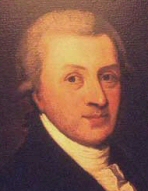 |
Arthur
Guinness (1725 - 1803)
Brewer. Guinness was born in Celbridge, Co Kildare. His father
was land steward to the archbishop of Cashel, Dr Arthur Price, and brewed beer
for workers on the estate. When Price died in 1752, he left £100 each to the two
Guinnesses, which may have encouraged the young man to lease a brewery in
Leixlip, Co Kildare, in 1756. Three years later, he left this brewery in charge of a younger brother, and took over
one at St James' Gate in
Dublin. He
began by brewing beer or ale, and within eight years was master of the Dublin
Corporation of Brewers. In 1761 he married Olivia Whitmore, a relative of Henry
Grattan (leader of the Irish Parliament), and ten of their twenty-one children lived to establish a dynasty
which has spread into many activities and countries. In 1778, Guinness began to
brew porter - the darker beer containing roasted barley and first drunk by
London
porters - and exploited
Ireland's new
canals to extend his market. In 1799, he brewed ale for the last time. Sales of
porter increased threefold during the Napoleonic Wars, and in time St James's
Gate became the largest porter and stout brewery in the world, its 'extra stout
porter' becoming known simply as stout. |
|
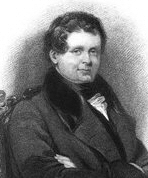 |
Daniel
O’Connell (1775 - 1847)
Politician. O'Connell was born near Cahirciveen, Co
Kerry. He attended English colleges in
France (due
to the Penal Laws Catholics were not allowed to enter universities). The O'Connells were prosperous
Roman Catholics; it had been illegal to educate the boy abroad, but a 1792
Relief Act changed this and also allowed him to become a successful barrister
on the Munster Circuit. A constitutionalist in politics, O'Connell opposed the
violence of the 1798 and 1803 risings. In 1823, he formed the Catholic
Association; membership eventually cost a 'Catholic rent' of a penny a month. His objective was Catholic emancipation,
opening up state and judicial posts and the right to sit in parliament. A
powerful nationwide organisation quickly emerged, with the help of the clergy, and
in 1824 the government unsuccessfully prosecuted O'Connell for inciting
rebellion. In 1828, he won a by-election in Co
Clare, but unwillingness to take the anti-Catholic oath of supremacy kept him
out of
Westminster. The
following year, the government conceded Catholic emancipation; 'The Liberator', as he was now known,
entered parliament after a by-election. In 1840, O'Connell again
marshalled mass support in the National Repeal Association, his public speeches
drawing enormous crowds. |
|
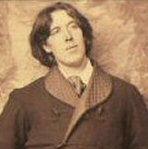 |
Oscar
Wilde (1854 - 1900)
Author.
Oscar Fingal O'Flahertie Wills Wilde was born in
Dublin. His
father was an eminent eye and ear specialist; his mother wrote under the
pen-name 'Speranza'. Wilde defeated Edward Carson (famous politician) for the
foundation scholarship in classics at
Trinity
College,
Dublin, and
in 1874 won a scholarship to
Magdalen
College,
Oxford. He
became a disciple of aestheticism, pursuing beauty for beauty's sake; his poem
Ravenna
(1878) won the Newdigate Prize. His first success was The Happy Prince
(1888), but his novel The Picture of Dorian Gray (1891) offended
Victorian susceptibilities. The triumph of his play Lady Windermere's Fan
(1892) inaugurated his most glorious years. It was followed by A Woman of No
Importance (1893), An Ideal Husband (1895) and The Importance of
Being Earnest (1895). In a libel case, Wilde collapsed under
cross-examination by his old rival Carson, and in 1895 was sentenced to two
years' hard labour for homosexual offences, which inspired The Ballad of
Reading Gaol (1898). Performances of his plays were cancelled. Wilde's wife changed her surname and with her two young sons, moved abroad to
escape the scandal. |
|
 |
George Bernard Shaw (1856 - 1950)
Author. Shaw was born in
Dublin. His
mother, a fine mezzo-soprano, left her drunkard husband to follow her singing
teacher to
London. In
1876, Shaw gave up his job in an estate agency and joined her. A small legacy
enabled him to write five novels over the next few years, but with little
success. He was converted to socialism (and vegetarianism) and joined the
Fabian Society, forcing himself to become a public speaker. In 1885, a fellow
Fabian persuaded The Pall Mall Gazette to employ Shaw as a book
reviewer; he also became a notable music critic for The Star. His first
play was Widowers' Houses (1892), and thereafter he wrote prolifically.
Early plays such as Arms and the Man and Candida displayed
intellectual wit, but his first real success was the American run of The
Devil's Disciple (1897). In 1898, he married Charlotte Payne-Townshend, a
rich Anglo-Irish Fabian who had nursed him through illness. In 1906, they moved
to
Ayot St
Lawrence in
Hertfordshire. In 1904, King Edward VII laughed so much at John Bull's Other
Island that he broke his seat at the
Royal
Court
Theatre;
other triumphs at that
London
theatre were Man and Superman (1905), Major Barbara (1905) and The
Doctor's Dilemma (1906). Shaw's Pygmalion (1914) was destined to
have a second success as the musical comedy My Fair Lady. Shaw's
popularity suffered when, in a 1914 manifesto, 'Common Sense about the War', he
suggested soldiers of every army might be wise to shoot their officers.
However, ex-servicemen enjoyed a revival of Arms and the Man in 1919,
and he had further successes before receiving the Nobel Prize for Literature in 1925. |
|
 |
James Joyce (Augustine Aloysius) (1882 -
1941)
Writer. Born in
Dublin. He
studied in
Dublin, went
in 1902 to
Paris to
study medicine, then took up voice training for a concert career. Back in
Dublin, he
published a few stories but, unable to make a living by his pen, he had to tutor
in English. He started the short-lived Volta Cinema Theatre in 1909, and left
Dublin in
1910. He later went to Zürich (1915), where he formed a company of English
players, settled in
Paris
(1920-40), then returned to Zürich, where he died. His early work includes the
short stories, Dubliners
(1914), and A Portrait of the Artist as a Young Man (1914-15). His
best-known book, Ulysses,
based on one day in
Dublin (16 Jun 1904),
appeared in
Paris in
1922, but was banned in the
UK and
USA until
1936. Work in progress began to appear in 1927, and finally emerged as Finnegans
Wake (1939). Hailed as the father of literary modernism, his work
revolutionized the novel form, partly through the abandonment of ordinary plot
for "stream of consciousness', but more fundamentally through his
unprecedented exploration of language. |
|
 |
Michael
Collins (1890 - 1922)
Revolutionary. Collins was born near Sam's Cross,
Clonakilty, Co
Cork. He
became a post office clerk in 1906. Sent to
London, he
learned Irish at Gaelic League classes and joined Sinn Féin. During the Easter
Rising, Collins fought in the General Post Office. When Eamon de Valera and
other republicans were arrested in 1918, Collins eluded the police and began to
build up a remarkable secret intelligence system. Elected MP for
South
Cork in 1918, 'the Big Fellow' became home minister in the First Dáil, but missed its opening
preparing de Valera's escape from
Lincoln jail. He later became president of the IRB's supreme council. In the ensuing
guerrilla warfare, Collins' special squad systematically assassinated members
of the 'G' division of the
Dublin
police,
Dublin
Castle's
(the British headquarters in Dublin)
main source of intelligence; he had his own informants at detective
headquarters. On 'Bloody Sunday',
21 November 1920, his men shot dead eleven British
intelligence officers. In retaliation, British Black and Tans killed fourteen
people at a football game. Collins' family home in
Cork was
burned out in April 1921. A reluctant negotiator and signatory of the 1921 Anglo Irish Treaty,
Collins wrote 'early this morning I signed my death warrant'. He became chairman of the provisional government
which preceded the
Irish Free State, and
Dublin
Castle was surrendered to him. On
the outbreak of the Civil War in June 1922, he took command of the forces loyal
to the government. On
22
August 1922, he was ambushed and shot dead by anti-Treaty IRA men (who possibly had been under orders by Eamon de
Valera). |
|
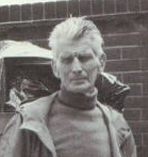 |
Samuel Beckett (1906 - 1989)
Writer and playwright, born
in
Dublin,
Ireland. He
became a lecturer in English at the Ecole Normale Supérieure in
Paris and
later in French at
Trinity
College,
Dublin. From
1932 he lived mostly in
France and
was, for a time, an associate of James Joyce. His early poetry and first two
novels, Murphy (1938) and Watt (1943, published 1953), were
written in English, but not the trilogy Molloy (1951), Malone Meurt
(1951, Malone Dies), and L'Innommable (1953, The Unnamable), or the
plays En attendant Godot (1954, Waiting for Godot), which took London by
storm, and Fin de partie (1956, End Game), all of which first appeared
in French. His later works include Happy Days (1961), Not I
(1973), and Ill Seen Ill Said (1981). He was awarded the 1969 Nobel Prize for Literature.
|
|
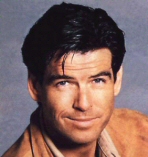 |
Pierce Brosnan (1953 - )
Actor. Born in the
small town of
Navan,
County
Meath. Brosnan's father, Thomas, left the family when Pierce was one year old and his
mother, May, fled to
London
shortly after, leaving the young boy with his grandmother in
Ireland. After an unsettled childhood, Brosnan reunited with his mother in
London when
he was 11. In 1973, he enrolled at the
Drama Centre in
London,
where he studied for three years. Brosnan played on the
London stage
for several years. Impressed with Brosnan’s dark good looks and polished charm,
Broccoli (producer of the James Bond films) immediately promised him the
much-coveted role of Bond as soon as Roger Moore retired. His first Bond film, Golden
Eye was a smash hit, becoming the most successful Bond film ever when it
grossed over $350 million. More success followed with 1997’s Tomorrow Never
Dies and 1999’s The World is Not Enough. In 2002, he starred
with
Halle
Berry in Die
Another Day. |
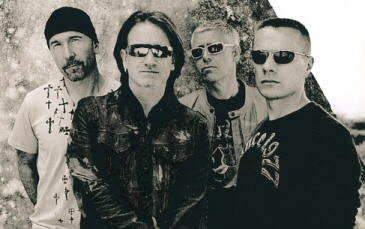 The
band is featuring Bono (Paul David Hewson); The Edge (David Howell Evans); Adam
Clayton; and Larry Mullen, Jr..
The
band is featuring Bono (Paul David Hewson); The Edge (David Howell Evans); Adam
Clayton; and Larry Mullen, Jr..








